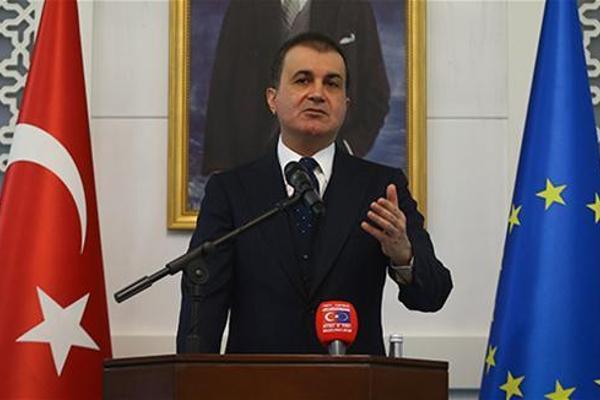Ankara rebuffs EU’s harsh progress report
ANKARA/BRUSSELS


“They shamelessly say that Turkey’s EU negotiations should be reviewed. You are already late. Reassess it, but do not delay in reassessing it. Make your final decision,” Erdoğan said.
Rebuffing the criticisms regarding political criteria, fundamental freedoms and the judiciary in the report, EU Minister Ömer Çelik said Turkey was going through an extraordinary period “unprecedented even for world history,” recalling the fight against terror and a July 15 coup attempt.
“The report was not drawn up in an understanding that serves relations between the EU and Turkey and is far from the perspective of accession negotiations,” he said.
Erdoğan reiterated Ankara’s determination to fight terror, saying thousands of people had been “martyred” in the struggle.
“If you will review Turkey’s EU negotiations because Turkey fights honorably against terrorism, you are late. Our struggle with terrorism will continue until the end,” he said.
The EU voiced grave concern about Turkey’s crackdown on opponents since the coup in the report, which made clear that Ankara’s prospects of joining the bloc have become ever more distant.
Turkey has rolled back the independence of the judiciary, freedom of expression and other fundamental democratic standards since the coup attempt, the EU said in its most hard-hitting annual report on the country’s long-running membership bid.
“The coup attempt of July 15 was an attack on democracy per se. Given the seriousness of the situation, a swift reaction to the threat was legitimate,” said the EU’s top enlargement official, Johannes Hahn.
“However, the large scale and collective nature of measures taken over the last months raise very serious concerns. Turkey as a candidate country must fulfil the highest standards in the field of the rule of law and fundamental rights. In this year’s report we therefore stress Turkey’s backsliding in the area of rule of law and fundamental rights,” he said.
According to Çelik, “there are sections in the report that are very far from being objective. We are faced here with a report that is far from being constructive and offering a way forwards.”
But the EU lost the opportunity to produce “a new vision” on this report, he said. Following the coup attempt, Turkey proved that it has “first-class quality in embracing democracy. Our nation has rewritten Europe’s and the world’s history of democracy,” Çelik added.
The EU could not properly understand Turkey’s fight against the Gülenists, he said, referring to the report’s criticism on the post-coup practices of the government. “This struggle is in line with universal law and the values shared with the EU,” Çelik said, stressing that the government would continue its fight against the Gülen movement.
The EU will have to accept the consequences if it decides to halt membership negotiations with Turkey, the president’s spokesman, İbrahim Kalın, said Nov. 9.
“If they resort to such ways, they will have to live with the results,” Kalın said in a televised interview. “If the EU is making threats to freeze accession talks, these threats don’t have any basis here.”
The bloc said a number of Turkish laws on the rule of law and fundamental rights were “not in line with European standards” and it expressed “grave concern” over the arrests last week of lawmakers from the Peoples’ Democratic Party (HDP), which focused on the Kurdish issue.
“The anti-terror law is not in line with the acquis [EU norms] with regard to its scope and definitions and its application raises serious fundamental rights concerns,” it said.
It also expressed “serious concern” over safeguarding human rights in Turkey, including on gender-based violence, discrimination, hate speech against minorities, hate crime and violations of gay rights.
“Regarding the renewed considerations to introduce a bill in parliament to reinstate the death penalty, the EU recalls that the unequivocal rejection of the death penalty is an essential element of the EU acquis and a central international obligation to which Turkey has committed,” the report said.
